hankyoreh
Links to other country sites 다른 나라 사이트 링크
[Interview] Six months into war, Ukraine refuses to become a “frozen conflict”
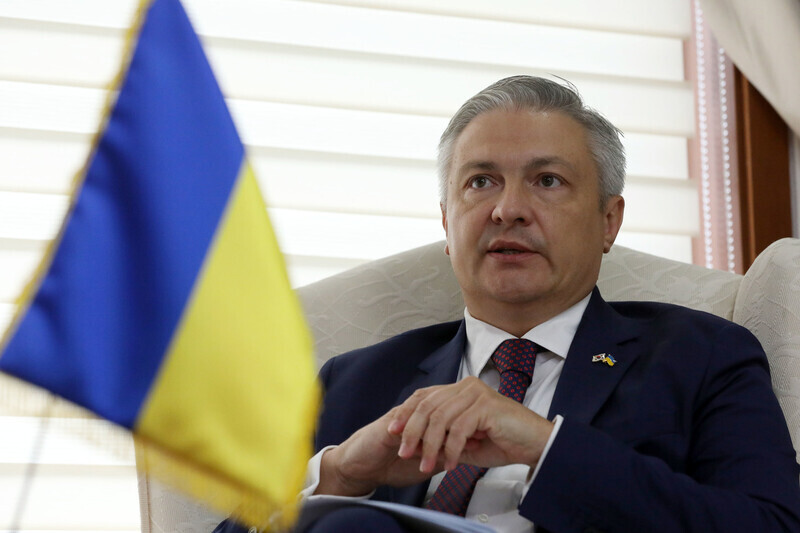
As war rages on in Ukraine, Wednesday marked two coinciding milestones for the country: the 31st anniversary of its independence from the Soviet Union and exactly six months since Russia’s invasion on Feb. 24. After more than 180 days of fighting, there still appears to be no end to the conflict in sight.
During these last six months, Dmytro Ponomarenko, the Ukrainian ambassador to South Korea, has been hard at work calling on the Korean government and private sector to lend a hand to reconstruction efforts in his home country. With winter only months away, more facilities are needed to house those displaced within the country’s borders so that cities recaptured after Russian occupation can be rebuilt.
As of Tuesday, Aug. 23, fierce battles are underway at the Zaporizhzhia nuclear power plant — the largest nuclear power plant in Europe — and along the southeastern front lines. With the death count only growing and Ukrainian cities being razed to the ground, many wonder if peace negotiations between Ukraine and Russia will be possible. The Hankyoreh sat down with Ponomarenko at his office on Aug. 18 to discuss the current stage of the war and the prospect of negotiations.
Hankyoreh: As of Aug. 18, the war has been going on for 176 days (182 days as of Aug. 24). How do you assess the situation right now?
Ponomarenko: As of now, Russia’s offensive in Ukraine has stalled, although the attempts of limited advances continue along the front line. Russia tries to reinforce its troops, but its reserves are not very impressive both in terms of quality and quantity.
Hani: Do you see the Ukrainian forces as having a chance of coming out victorious?Ponomarenko: Ukrainians do not question their chances of winning. Our future is at stake, so we are dedicatedly working for victory, each in our own place. The only question is “when.” The faster we receive all necessary support — both military and financial — from our partners, the nearer the war’s end. If we do not stop Putin now, the war will spread all over the world like cancer.
Hani: Various estimates of the scale of civilian and military casualties are circulating. What is the scale of civilian deaths and injuries that you have identified?Ponomarenko: It is extremely difficult to be precise when calculating casualties in war while hostilities are still ongoing.
According to estimates by the Ukrainian Defense Ministry, Russian casualties have reached 43,750 killed as of Aug. 15. Adding the wounded, the total number may well be up to 80,000, as our Western partners estimate.
I do not have the number for Ukrainian troops. By the laws of warfare, the ratio of casualties is heavier for the attacking forces (usually 1:3). Although we understand the losses on our side are also significant.
At present, there have been investigations launched into more than 26,300 war crimes and crimes of aggression committed by Russia since Feb. 24. These cases include the killing of some 6,700 people, including 358 children, and the wounding of 8,700 civilians, including 693 children. The figures, which are growing daily, do not account for the occupied territories, to which our law enforcement officers do not have access.
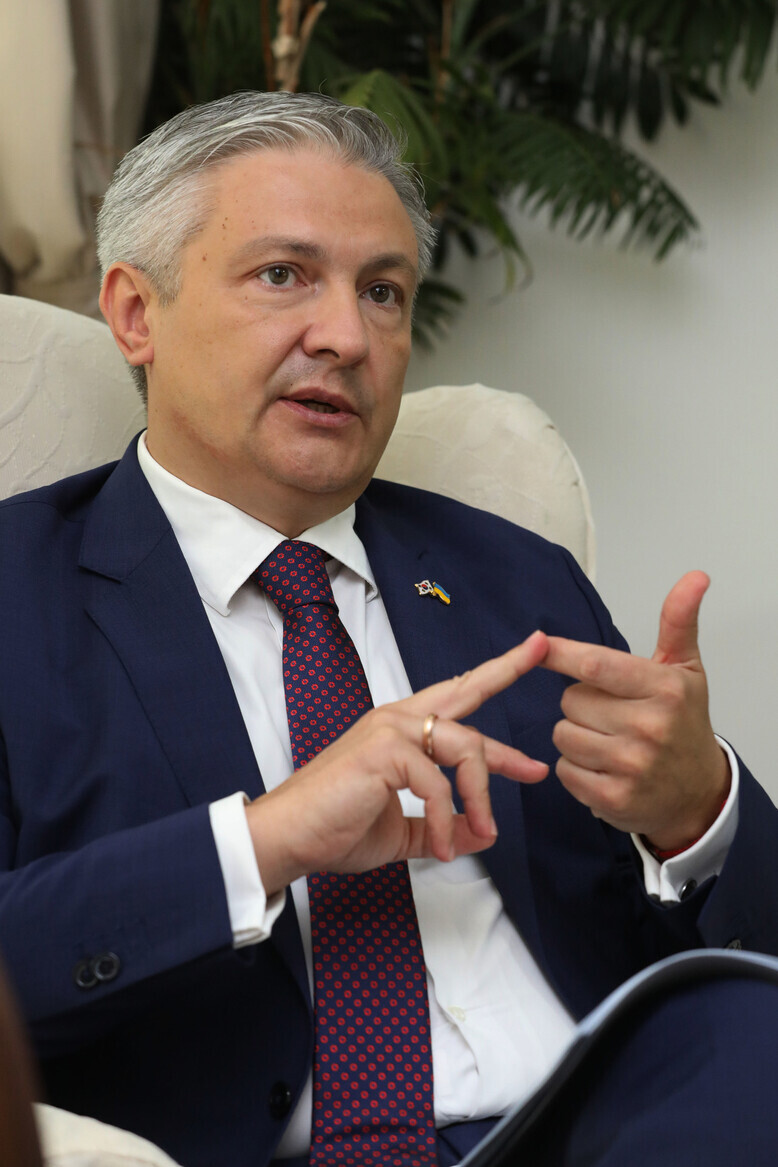
Ponomarenko: Yes, it is extremely dangerous. Particularly if you take into consideration that the Zaporizhzhia nuclear power plant is the largest in Europe and the sixth largest in the world. That is why Ukraine strongly condemns the actions of the Russian occupying forces on the territory of the Zaporizhzhia nuclear power plant in the city of Energodar. Having captured the nuclear power plant, the Russians are using it for blackmail and as a shield for their weapons. While stating that it has no intention of using nuclear weapons in Ukraine, Russia resorts to numerous provocations at the nuclear facility.
After military trucks and SUVs filled with weapons were moved to the premises of the first and second blocks of the plant, which are under service, at the beginning of August 2022, artillery shelling of the territory near the Zaporizhzhia nuclear power plant industrial site took place on Aug. 5, 2022. As a result of the three recorded hits, the high-voltage power supply line of the power plant was damaged. We urge the international community to take measures so that Russia stops using the nuclear power plant as a means of intimidation and nuclear blackmail and so that Ukraine can regain control of its power plant for the sake of the security of the whole world.
Hani: What percentage of Ukraine’s total territory has been destroyed in the course of the war?Ponomarenko: As of today, nearly 21% of Ukraine’s territory, comprising more than 2,600 towns and villages, is occupied by Russia. Before the war, these places produced nearly 19% of Ukraine’s GDP.
Hani: Cities across Ukraine are carrying out reconstruction efforts with various forms of support provided by the international community. What kind of support is the Korean government providing? Are Korean companies contributing?Ponomarenko: The government of Korea has announced US$100 million in humanitarian assistance. We are closely working with Korea on the composition of this humanitarian assistance. Currently, each country is choosing a point on the map of Ukraine where they will help rebuild life there from scratch. For example, representatives of the European Investment Bank have already announced their intention to help rebuild Mariupol after its liberation. Great Britain chose Kyiv, Poland chose Lviv, and Turkey chose the Kharkiv region. I’ve continued to explain this plan to the Korean government, starting with [former] President Moon. I proposed to him that Korea choose one region or one city in Ukraine and take patronage over this region and rebuild it. I spoke about it to the minister of foreign affairs, the speaker of the parliament, as well as with the business community. We are still waiting on Korea to provide answers with concrete proposals.
Hani: Do you think Korea is providing enough support to Ukraine?Ponomarenko: It’s really a very difficult question. I know that Korea had not previously supplied any other country with such huge sums of humanitarian assistance. But we spend several billions of dollars every month for the war, so definitely we need much more financial assistance. We haven't received military assistance from Korea. Will Korea get involved militarily is the question, and it is a very important one to us. To end the war, we need not only financial and political assistance, but military assistance as well. As you ask, is it enough? It's not enough.
Hani: Have you spoken to President Yoon Suk-yeol about this?Ponomarenko: I had the chance to meet him while he was a candidate. I met him one week before the election and we had a very fruitful discussion. And I understood from his words, that at that time, he was very keen to help Ukraine and to participate in the international help to our country. I understand that it’s important that the government of Korea maintains a balance in its international politics, especially at the beginning of the president’s term. But we are still waiting for real steps from the Korean government.
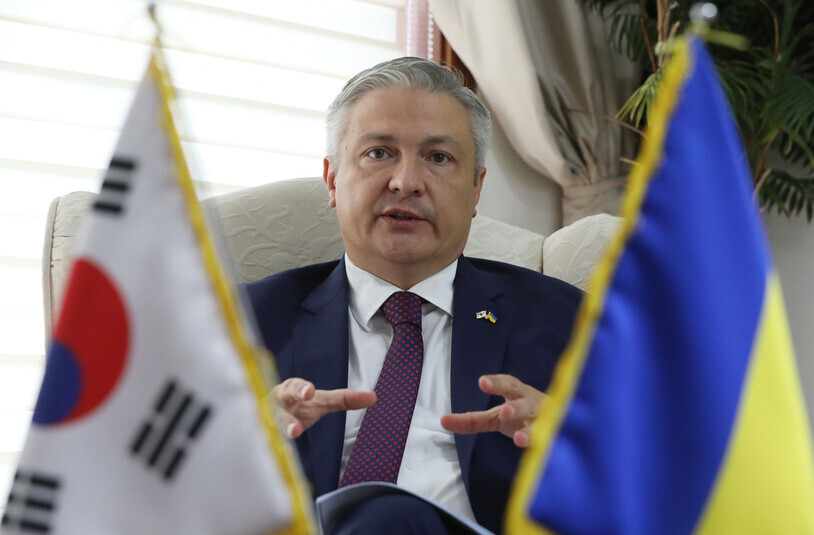
Ponomarenko: We need to build new facilities, mostly in the western part of Ukraine, for the [internal] refugees fleeing territories that are either already occupied or are now under massive shelling by Russian forces. They need new houses to live in, especially with winter coming. We must quickly repair the civil infrastructure, like schools, roads, bridges, and the infrastructure needed for daily life.
Hani: How long will it take to rebuild?Ponomarenko: I do not think we will be able to put a timeframe on rebuilding until the war is actually over and the full scale of damage is assessed. As of now, the key goals of Ukraine’s National Recovery Plan are: achieving more than 7% GDP growth per year; reaching the top 25 on the economic complexity index; reaching the top 25 on the World Bank Human Capital index; and 65% reduction in CO2 emissions compared to 1990. We plan to achieve this in three stages, which will be implemented in the order of urgency. The first plan relates to financing critical work on renewal under the formula “here and now.” For example, repairing the water supply in the Chernihiv region or rebuilding bridges in the Kyiv region. However, the implementation of the next two stages, which include the restoration of several thousands of infrastructure facilities and the long-term transformation of Ukrainian industries according to EU standards, must wait for the end of the war. This year we need at least US$60 billion-US$65 billion.
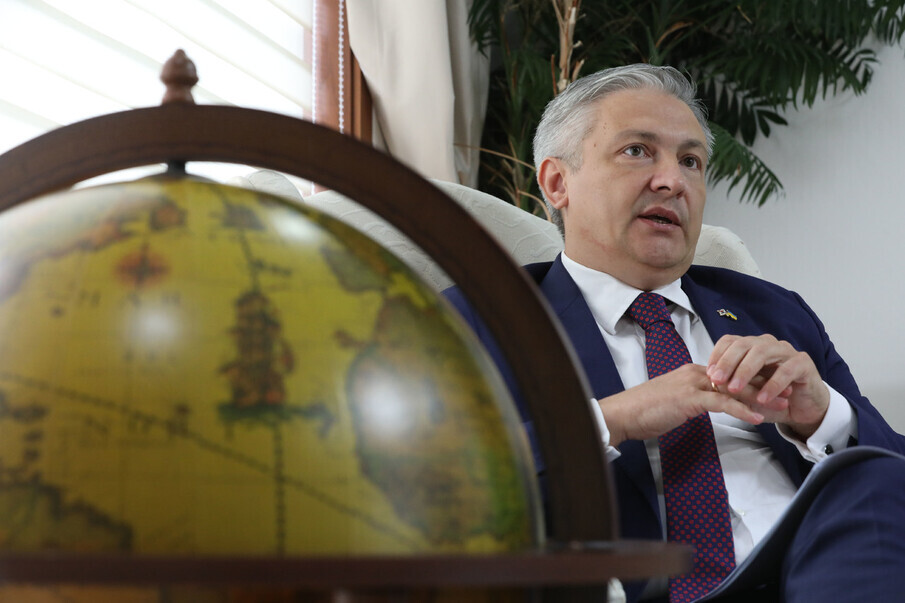
Ponomarenko: As of now, about 20 million tons of grain are in stock for export from Ukraine’s yield from the previous year. According to USDA (US Department of Agriculture) data based on 2021/2022 performance, Ukraine accounts for more than 10% of all wheat worldwide export, 14% of all corn, 17% of all barley and 47% of all sunflower oil. It’s really a huge amount of food, which is stuck now by Russians in Ukraine and at ports. Russia is using the threat of global hunger as leverage in pushing forward its self-interests and promoting its neocolonial policy agenda.
Hani: Ukrainian farmers are striving to farm even during the war. Ukrainian agriculture is also an important issue for global food security. What is the current state of agricultural production and what is the biggest difficulty the sector faces?Ponomarenko: This is quite a difficult time for Ukrainian farmers. Russia’s invasion of Ukraine deepens the global food crisis with its blockade of seaports and deliberate destruction of Ukrainian agricultural infrastructure and logistics. Because of the war, the occupation of part of our territories, and shelling, Ukrainian forecasts of agricultural exports in 2022 will be much more modest compared to the previous year.
Nevertheless, up to 70 million tons are expected to be harvested in the coming months. Ukraine is strongly committed to starting to export grain via the Black Sea as soon as possible and is not blocking or delaying it by any means.
Hani: Winter in Ukraine is expected to be very severe. There have been reports that citizens still in the southeastern part of the country where fighting is ongoing are experiencing inconsistent access to power and water supplies.Ponomarenko: Our government is working hard on this. We are doing our utmost to at least repair the facilities so that civilians don’t have to go through winter in the worst of conditions.
Winter will be difficult not only for Ukraine, but also for other European countries. Gas prices will go up and there will be energy shortages. Russia has chosen a strategy of political blackmail through threats of blocking the supply of energy resources to Europe. Countries in Europe are saying that sooner is better than later when it comes to cutting old relations [with Russia]. I think that soon, Europe and elsewhere in the world will change their supplier of energy or change the proportion of energy from solar, from wind, from nuclear power.
Due to the significant collapse of its industrial production, Ukraine has now a surplus of electricity generation. Thus, there should not be shortages of electricity in the free territory of Ukraine. But it remains dangerous because there is the possibility of Russia cutting us off from electricity produced by our nuclear plants.
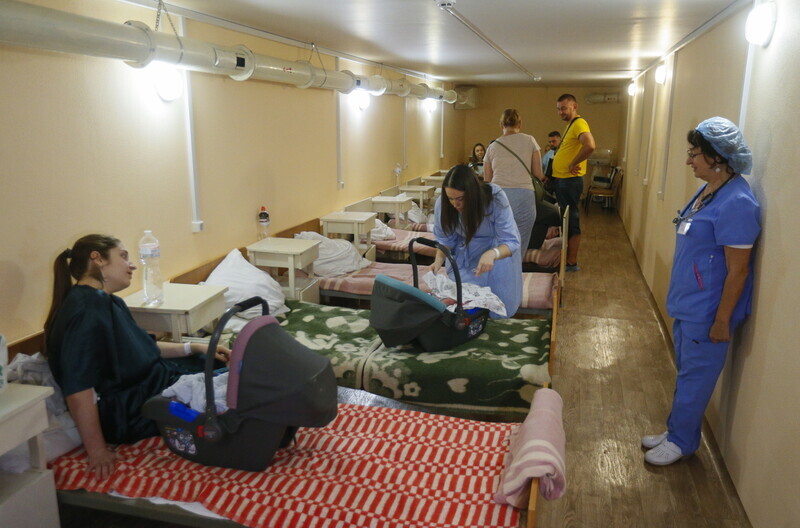
Ponomarenko: The official position of the Ukrainian government is that we can think about negotiations only when Russia returns the situation to what it was prior to Feb. 24. We cannot negotiate as things currently stand. 89% of Ukrainian citizens believe that the war must end with the complete liberation of Ukraine’s territory within the internationally recognized borders. For instance, Mariupol is under the control of the Russians now, but tens of thousands of the city’s people have been killed there. How are they to accept Russia’s rule?
The populations of the Russia-occupied areas of Ukraine continue to fiercely resist occupation. Ukrainian citizens do not accept the so-called “Russian world,” which brings only death, destruction and fear. Our government will not stop until we achieve our goal.
No ceasefire, demilitarization or disengagement would be appropriate: We do not want to establish another “frozen conflict” or give Russia a respite to prepare for the next invasion. So, to give a short answer to your question: What’s next is that we continue fighting until Russia is weakened sufficiently to negotiate peace on our terms.
Hani: What is public opinion like amongst Ukrainians? Are they tired of this situation in which people continue to die across the country as time goes on?Ponomarenko: The current situation constituted a real dilemma for Ukrainians. Because we understand that as long as the war goes on, there will be more casualties. But at the same time, it's very difficult to accept concessions or negotiations. We’ve already lost 21% of Ukrainian territory. That’s equal to the territory of Korea. How can you just leave it behind? They won’t stop at this; they will move, they will prepare and move farther. If the war stops, they will prepare and move farther.
So that’s why the understanding of President Zelenskyy and the government of Ukraine is that we have to repel them from the territory, at least, to the point they were before Feb. 24. Because if we allow them to stay where they please, they will not stop there. They have no reason to stop there. First, they’ll take half of Ukraine, and then another half of Ukraine, then they’ll go on into Eastern Europe, as previously was under Soviet Union control.
During World War II, the peace process started only when Nazi Germany was totally defeated. But when you say, "Let's stop on this point," you’ll possibly maintain this peace for the next one to three years. But after this, there will be yet more conflict.
By Noh Ji-won, staff reporter
Please direct questions or comments to [english@hani.co.kr]

Editorial・opinion
![[Column] Season 2 of special prosecutor probe may be coming to Korea soon [Column] Season 2 of special prosecutor probe may be coming to Korea soon](https://flexible.img.hani.co.kr/flexible/normal/500/300/imgdb/original/2024/0426/3317141030699447.jpg) [Column] Season 2 of special prosecutor probe may be coming to Korea soon
[Column] Season 2 of special prosecutor probe may be coming to Korea soon![[Column] Park Geun-hye déjà vu in Yoon Suk-yeol [Column] Park Geun-hye déjà vu in Yoon Suk-yeol](https://flexible.img.hani.co.kr/flexible/normal/500/300/imgdb/original/2024/0424/651713945113788.jpg) [Column] Park Geun-hye déjà vu in Yoon Suk-yeol
[Column] Park Geun-hye déjà vu in Yoon Suk-yeol- [Editorial] New weight of N. Korea’s nuclear threats makes dialogue all the more urgent
- [Guest essay] The real reason Korea’s new right wants to dub Rhee a founding father
- [Column] ‘Choson’: Is it time we start referring to N. Korea in its own terms?
- [Editorial] Japan’s rewriting of history with Korea has gone too far
- [Column] The president’s questionable capacity for dialogue
- [Column] Are chaebol firms just pizza pies for families to divvy up as they please?
- [Column] Has Korea, too, crossed the Rubicon on China?
- [Correspondent’s column] In Japan’s alliance with US, echoes of its past alliances with UK
Most viewed articles
- 1After election rout, Yoon’s left with 3 choices for dealing with the opposition
- 2Two factors that’ll decide if Korea’s economy keeps on its upward trend
- 3Noting shared ‘values,’ Korea hints at passport-free travel with Japan
- 4AI is catching up with humans at a ‘shocking’ rate
- 5Why Kim Jong-un is scrapping the term ‘Day of the Sun’ and toning down fanfare for predecessors
- 6South Korea officially an aged society just 17 years after becoming aging society
- 7Korea’s 1.3% growth in Q1 signals ‘textbook’ return to growth, says government
- 8Value of Korean won down 7.3% in 2024, a steeper plunge than during 2008 crisis
- 9‘We must say no’: Seoul defense chief on Korean, USFK involvement in hypothetical Taiwan crisis
- 10Is Japan about to snatch control of Line messenger from Korea’s Naver?